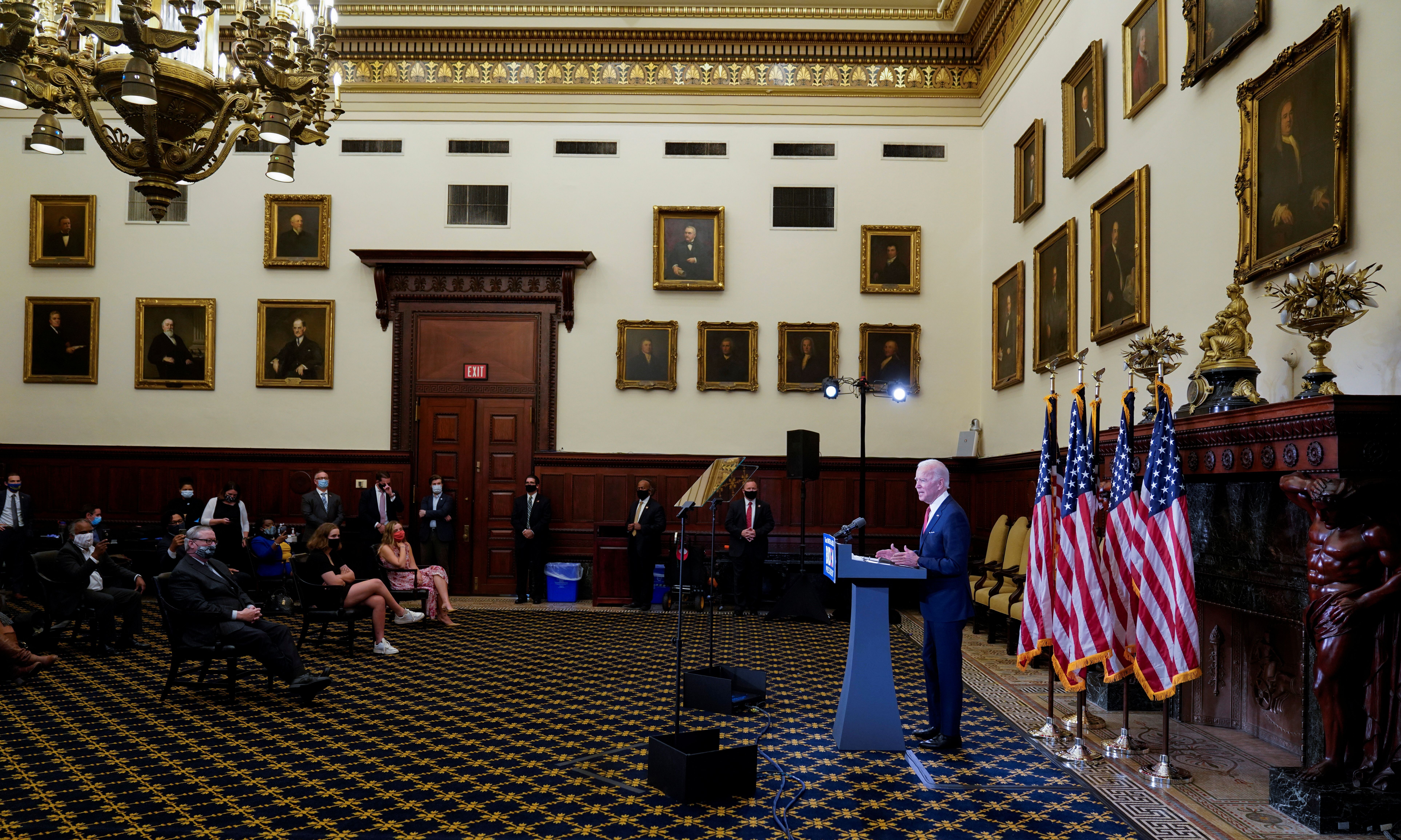Joe Biden and Progressive Democrats

With all his opponents having suspended their campaigns since the primaries, it is certain that during the August Democratic Party convention, Joe Biden, the former vice president in the Barack Obama administration, will win the party’s nomination as president for the November election. Biden is seeking to consolidate the Democratic electorate, which in some early primaries voted for his rivals, including Senators Bernie Sanders and Elizabeth Warren, representing the “progressive” wing of the party. These politicians are distinguished by more leftist views and a focus on social issues. The importance of this part of the party has increased in recent years—in elections to the U.S. House of Representatives in 2018, progressives won 98 out of all 235 seats won by the Democratic Party. The decision to include some of them on Biden’s electoral staff shows the strength of the progressive faction and the importance of its most important representatives. With broad cooperation, Democrats want to avoid the 2016 situation when neither progressive politicians nor progressive voters united sufficiently around Hillary Clinton’s candidacy.
The Scope of Cooperation
During the primaries, as candidates withdrew from the competition, they mostly endorsed Biden. Ultimately, when Sanders and Warren also suspended their campaigns, they quickly made the same decision. Biden’s candidacy was also endorsed by other prominent progressives in Congress—the chairs of the Congressional Progressive Caucus, Pramila Jayapal and Mark Pocan, as well as their deputy and a Sanders presidential campaign co-chair, Ro Khanna. Among the potential candidates for vice president (Biden made a promise to entrust this role to a woman) are two progressives—Warren and Stacey Abrams (a member of the Georgia House of Representatives in 2007-2017 and candidate for governor of Georgia in 2018).
In addition, Biden’s staff have set up “unity task forces” in which progressive and moderate Democrats cooperate. Their purpose is to develop recommendations for the Biden campaign in the last months before the election, after the August convention. The task forces focus on six areas recognised by Biden’s staff as key for cooperation—climate policy, criminal law reform, education, economy, healthcare and immigration. Foreign policy is not one of the areas (with immigration and climate change perceived as internal issues), which indicates that this area is less open to cooperation ahead of the election.
In the face of COVID-19, healthcare, social security, and other social policy reforms are all the more championed by progressives. The ideas they promote have already been partly incorporated by Congress and the Trump administration as temporary assistance solutions (including the extension of the group covered by social spending and increasing public assistance). Now, progressives strive to maintain those initiatives.
Consequences for Biden’s Foreign Policy Concepts
Foreign policy is neither a priority in Biden’s cooperation with progressives, nor a key topic for voters. The fight against the effects of the pandemic along with the BLM protests and the resulting debate about the situation of the black minority and police brutality in the U.S. will further reduce the role of foreign policy in the election. Progressives also criticize Biden’s approach to foreign policy, considering it too moderate and old-fashioned on the U.S. position in the international arena. Their main goal is to limit the use of the American armed forces, and thus also to reduce defence spending. These issues can lead to disputes—Biden believes that the foreign presence of American troops is important for global peace and an important element of U.S. compliance with allied commitments.
According to Biden, the most important challenge for the U.S. internationally is the competition with China. The approach in economic relations towards China would be based on retaliatory actions taken jointly with allies against unfair practices in international trade and theft of intellectual property. In addition, Biden calls for a stronger U.S. position on China regarding compliance with international law and human rights. On the military level, Biden supports strengthening cooperation with allies in Asia and strengthening the regional U.S. military presence.
Towards Russia, Biden has announced that deterrence policy will be maintained. As priority actions in this area, he indicates support for Ukraine to resolve the conflict in Donbas and seeks the return of Crimea and further strengthening NATO’s Eastern Flank. The U.S. policy on LNG exports, which serves to limit Russia’s influence in the European energy sector, will not change. At the same time, Biden points to the need for dialogue with Russia (and also with China) on arms control—he spoke in favour of maintaining the New START Treaty and criticised the U.S. withdrawal from the Open Skies Treaty.
Biden may also prioritise reversing some of Trump’s decisions that squandered the Obama administration’s achievements and weakened the U.S. international position. The main activities in this field seem to be a return to the Paris Agreement and the nuclear agreement with Iran (JCPOA).
Biden has announced an improvement in transatlantic relations with the European Union and its Member States, and countries in NATO. He also proposes a review of U.S. alliances based on common values, which would lead to limiting, and in extreme cases, cessation of cooperation with national governments assessed by Democrats as authoritarian or moving away from democracy. This idea is strongly emphasized by progresses and pertains to, among others, Brazil, Hungary, Israel, Philippines, Saudi Arabia, and Turkey.
Conclusions
Biden and progressives are working together on internal American policy. If Biden chooses a progressive woman as his vice presidential candidate, their cooperation agenda could expand. The inclusion of the progressive electorate seems to positively affect Biden's electoral chances. In recent national surveys, and in most states perceived as key to the presidential contest, Biden maintains an advantage of several percentage points over Trump. The strengthening cooperation with progressives and potential for shifts to the left on some issues are unlikely to threaten a loss of support among centrist voters who have contributed to Biden’s success in the primaries. The Democratic Party electorate sees the end of Trump’s presidency as the overarching goal.
In some polls, Biden’s advantage has increased amid the protests over the police killing of a black man, George Floyd. Trump is seen as dividing society and exacerbating social conflicts, a view that strengthens Biden’s candidacy. The public attention on the issue of social inequality and discrimination against minorities may force him to cooperate more with politicians of racial minorities, many of whom are progressive. The sudden and broad interest in this topic is now significant to election campaigns and reduces the interest of voters in other issues, including foreign policy, which pushes the candidates to focus on only the most important issues ahead of the election.
The reduction of U.S. military involvement promoted by progressives is unlikely to have a negative impact on the further strengthening of NATO’s Eastern Flank and the increased presence of troops in Asia. There is consensus in Congress about the need to conduct these activities and also to strengthen U.S. alliances with the countries of the region to deter China and Russia. That is why Biden may be even more encouraged by progressives to enter into a dialogue with Russia on disarmament, arms control, and confidence-building measures. A greater threat to plans to increase military involvement in these areas are possible cuts in government spending, which may be necessary due to the rapid increase in public debt (by more than $2 trillion since March) as a result of the pandemic. For this reason, a Biden administration is not expected to give up pushing NATO allies to meet the defence spending goal of 2% of GDP, especially as it was adopted as a result of pressure from the Obama administration.


